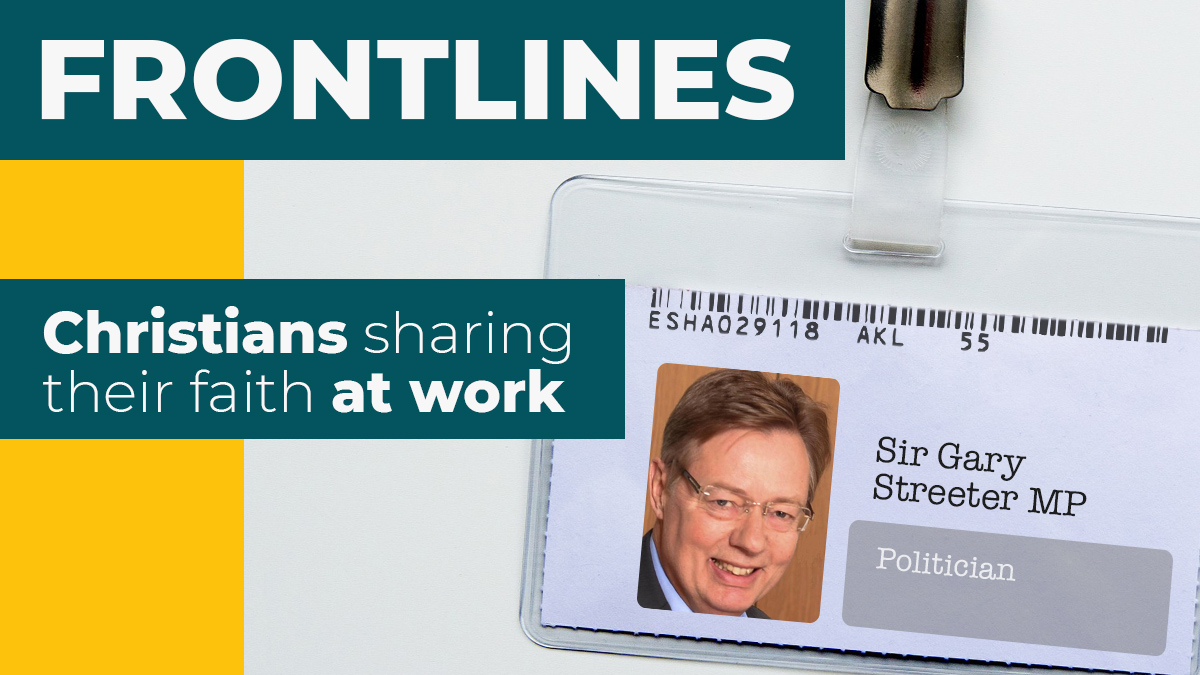In this edition of Frontlines we enter the world of politics. Sir Gary Streeter MP is the chair of the Christians in Parliament Group – a cross party group of MPs who share a Christian faith. Gavin Matthews spoke to Sir Gary for Solas, about what it’s like to be a Christian in politics.
Solas: Thankyou for joining us, Sir Gary! Tell us, a little about the work of an MP – which might be different in practice to what we might imagine!
GS: Hi Gavin. Well, I was a lawyer for the first ten years of my career until I felt called into politics, and initially leant my trade as a city councillor in Plymouth before becoming an MP in 1992. Now as an MP, I am one of 650 members making laws on behalf of the nation each representing about 70,000 adult constituents. We raise issues in parliament, we run campaigns, (everyone has their own special interests), then thirdly we are there to help individual constituents with their problems. Weekly surgeries are busy, as people come with all sorts of problems and we do our best to ‘unlock’ the system – whether it’s the local council, the benefit agency etc.
Solsas: And of all those things, what gives you the most job satisfaction?
GS: That’s an interesting question! I’ve been in Westminster for 28 years now and what I’ve always found is that helping people with their individual problems has been the most satisfactory element of the job. The vast majority of people who come to MP’s surgeries are doing their best in life, and just need a bit of help. And it is a pleasure to be able to help them.
Solas: What are some of the challenges you face in your work, and how does your faith in Christ help you to navigate them?
GS: I wouldn’t be a member of parliament if I wasn’t a Christian. I got saved aged 23, and by the age of 30 knew very little about politics really. But I felt a very distinct calling into the world of politics. I came back from a day of prayer and fasting to try and discern what God had for my future and shared this with my wife and her reaction was, “Oh No!” and she was right! So I really wouldn’t be in this field if I wasn’t a Christian and felt this calling.
There are so many challenges, but I think that it is very good to have a compass; something to guide you. I dislike it when Christians think that there easy answers to the very complex issues we face in a messy world; there are grey areas which we need to learn to navigate with skill and wisdom. So tussling over issues is just as hard for believers as for non-believers. But we do so with a compass and a map – and that is quite useful.
Most MPs are away from their families three or four days a week too – and that is a tough call and a real sacrifice. I often say to my wife, “I love you” and she replies, “So much that you get on the train on a Monday and don’t come back until Friday!” However, we know that this is a calling for which there is a sacrifice, but also much fruit too.
The other thing is that politics can be absolutely nasty at times. As Christians we like to think the best of other people, take them at face value, and we don’t like to promote ourselves. Well, you have to turn all that on its head in politics, you have to promote yourself and you have to be wise (if not cynical) about other people’s agendas. So, it takes a lot of learning. So any young person feeling a call into politics should take their time, let God set the timing and learn the trade at a grass roots level on a local council. It’s a minefield out there and I’ve seen young Christians get ‘blown-up’ if they attack it too quickly.
Solas: How does your faith make a difference to the way you approach the work itself? You’ve talked about having a map, a compass and a calling. How does that affect your work?
GS: Twenty-eight years ago when I started out people used to say to me, “How can you be a Christian involved in politics?” Well, hardly anyone says that to me now. A quarter of a century later there is an understanding that we must be involved. And what is politics? It’s about making decisions about how to care for elderly people, what kind of health service we have, when to go to war – it’s everything. Why would you want to exclude men and women of faith and values from that arena? For most of the twentieth-century we excluded ourselves thinking that it was too dirty, it wasn’t for us and look at the results! So we’re on the field at last – and that’s good.
We should be bringing to our politics, narrative and the political field, the integrity that we read of in the Bible. We should bring compassion and obviously the spiritual dimension through prayer. So in those three areas we should look a bit different and sound and act a bit differently too.
 This might be a surprising answer to your question too, but the first thing is to make sure you join the right political party! Politics is not an individual game, it’s a team-game. In my outlook on life I am centre-right on the political spectrum and therefore most of the decisions my party makes I am happy with. I have some wonderful friends in the Labour Party who I meet all the time. I’m chair of Christians in Parliament so I speak to Christians across the political parties on an almost daily basis. Those friends on the left have different priorities and a different outlook and so they are in the right party too. So if you are in the right party for you, there are fewer tensions and frictions. Sometimes when you are not fully persuaded of your party’s view, you go along with it as part of the team. However there are also times when you cannot go along with the party line, and on those occasions you need to have the courage to say so, and vote against your own party. I’ve only had to vote against my own team about twelve times in twenty-eight years and each of those was a painful experience, but sometimes you just have to take a stand.
This might be a surprising answer to your question too, but the first thing is to make sure you join the right political party! Politics is not an individual game, it’s a team-game. In my outlook on life I am centre-right on the political spectrum and therefore most of the decisions my party makes I am happy with. I have some wonderful friends in the Labour Party who I meet all the time. I’m chair of Christians in Parliament so I speak to Christians across the political parties on an almost daily basis. Those friends on the left have different priorities and a different outlook and so they are in the right party too. So if you are in the right party for you, there are fewer tensions and frictions. Sometimes when you are not fully persuaded of your party’s view, you go along with it as part of the team. However there are also times when you cannot go along with the party line, and on those occasions you need to have the courage to say so, and vote against your own party. I’ve only had to vote against my own team about twelve times in twenty-eight years and each of those was a painful experience, but sometimes you just have to take a stand.
Solas; So you are visibly a Christian at work – you chair the all-party “Christians in Parliament” group. How do people react when they know you are a Christian?
GS: Everyone these days is given credit for being ‘authentic’. I think that’s actually the crucial thing, not just about politics but in life. I dislike talent shows and reality TV programmes, but the people that win those things are invariably those who come across as authentic. People don’t look at me and think that I am known as a Christian for votes or popularity it is just who I am. In politics you do get attacked and being to the right I attacked from the left. It is much harder to be a Christian in the Labour Party than in the Conservatives (under Jeremy Corbyn it was almost impossible, but I hope and pray that will come right now under new leadership). Sometimes people will try and hurt you because of your faith saying things like “How can you as a Christian vote against X, Y or Z?” You actually have to grow broad-shoulders and shrug that sort of thing off. In the USA it is almost essential to be seen as a Christian to be involved in politics, here you do not get any ‘brownie-points’ for that. Here, it is essential to be authentic – and for me that means being Christian and most people accept that.
Solas: Has that ever given you opportunities to share anything of your faith with people you have met through work? What helped you to have good conversations – was it something you set out to do, or they arise naturally?
GS: Yes – we have seen a few members of parliament come to faith, in the decade that I have been chairing Christians in Parliament. We have seen conversions, and that is a wonderful thing! Personally I have addressed a lot of audiences about my faith, in person and online in all kinds of contexts. One-on-one conversations haven’t happened so much for me though – there have been a few. People do come up to me at work, (and other Christian MP’s) and ask what our secret is, because we have a calmness in the middle of some serious crises. That has provided an obvious “In” to talk about the faith that sustains us, because our security is not based on the results of the next election, or what Downing Street says, because our security is invested in a higher authority. So there have been opportunities and there has been fruit.
Solas: Have you ever had much reaction or push-back when you’ve talked about your faith, or objections?
GS: No, I don’t think I have encountered much. I know some Christians think that our freedoms are being squeezed out at the moment, but I’ve never felt that. I think you have to be wise and sensible, but I’ve given talks about my faith in meetings and online with no problems. Some groups try to enlist my support to take various people to court, but I think that is a last resort. Sometimes people think that they are being prevented from sharing the gospel, whereas they are just being downright offensive. If someone stands up in Brighton with a placard that says, “God hates gay people”, they are not sharing the gospel, and they will quite rightly get into trouble for that. When our fellow-travellers get the tone as wrong as that, they will get push-back but I personally have not, even though I have not been too fearful in sharing my faith.
Solas: That’s encouraging, and similar to what a lot of people are telling me in these interviews – they have freedom to speak where they are.
GS: I think the thing is that not many people have sat down and thought through the meaning of life and concluded that the secular-material view is the right one. Not many people think there was a big-bang and evolution and absolutely nothing else. People don’t do that, and this is the great mystery. I do quite a lot of apologetics-themed talks in my church here in Plymouth and one of the great mysteries is that no one asks those great questions! There’s something hanging in the ether that science answers everything – so when they meet people with a genuine faith – clearly and kindly expressed, there isn’t hostility there is often real interest.
Solas: So tell me about “Christians in Parliament” –obviously you want to have a public presence there, tell me about what that group exists to do?
GS: Well we do want Christians to be active in the public square, brining integrity, compassion and prayer into it. It’s a tough gig – for all sorts of reasons, so we exist as a group to encourage and equip other Christians from all parties and all backgrounds, and all manner of churches too, to help them serve as best as they can. I no longer think there is one blueprint for what that looks like, but we want each member to think through and pursue their calling and the gifting that God has given them. One person might be called to high office, another might campaign on abortion for twenty years. So I’ve been doing quite a lot of mentoring recently too, helping younger MPs across the parties. Our strapline has been “to equip you for Downing St and Heaven!”
Solas: So, finally then, what advice would you give a young Christian entering parliament who wants to be faithful to Christ?
GS: Two things really. The first is to find some like-minded fellow-travellers and meet with them regularly. So I’ve been blessed to be part of a small fellowship group made up of 2 Conservatives, 2 Labour, 1 Liberal Democrat and one DUP member for twenty years. We meet together to pray and encourage each other. Then secondly, be ready to learn and to change. Then thirdly recognise that there are Christians out there who may take a diametrically opposed view to you on something you think is fundamental. Fifteen years ago, in my little fellowship group of six we met to pray before we had to vote on a controversial bill. It turned out that three of us voted one way, and three the other. And yet, for many of us it was a fundamental issue. One phrase we sometimes say is that God’s kingdom is more important than our tribe. So, I‘d say fellowship, adaptability and working across differences of opinion are key.
Solas; Thanks, that has been really insightful and helpful!
GS: You’re very welcome!


